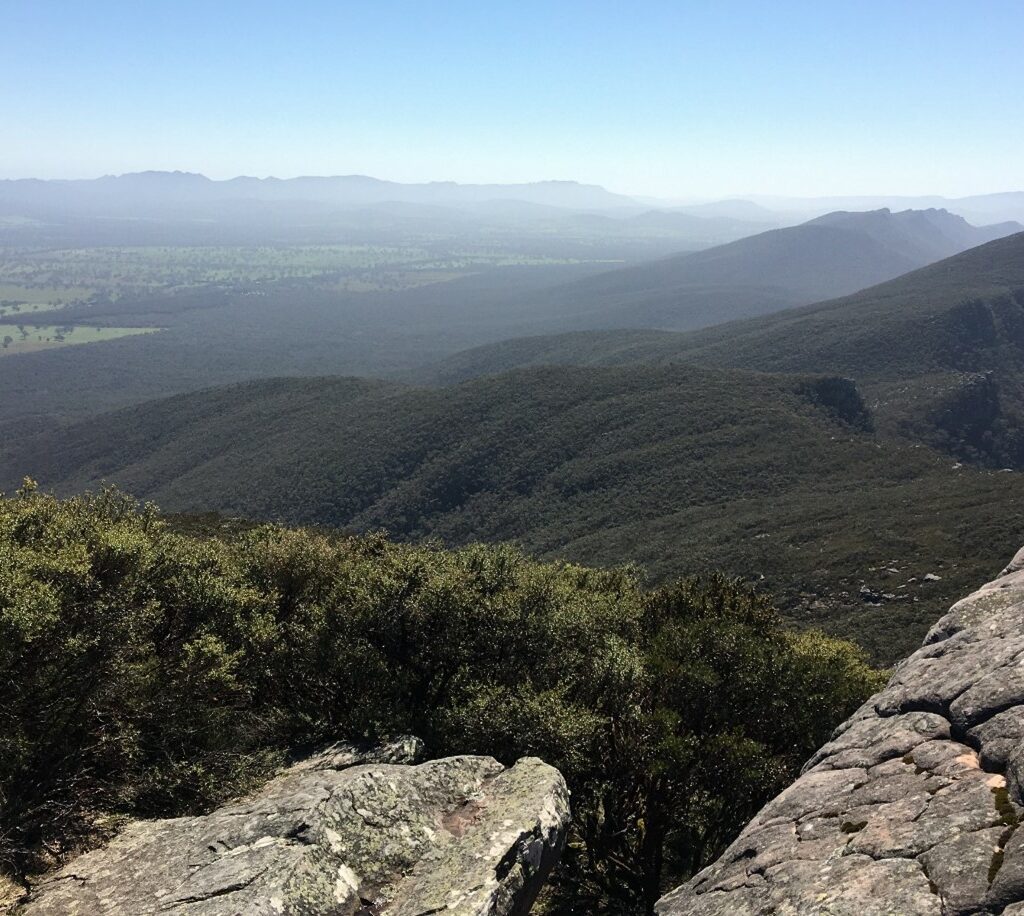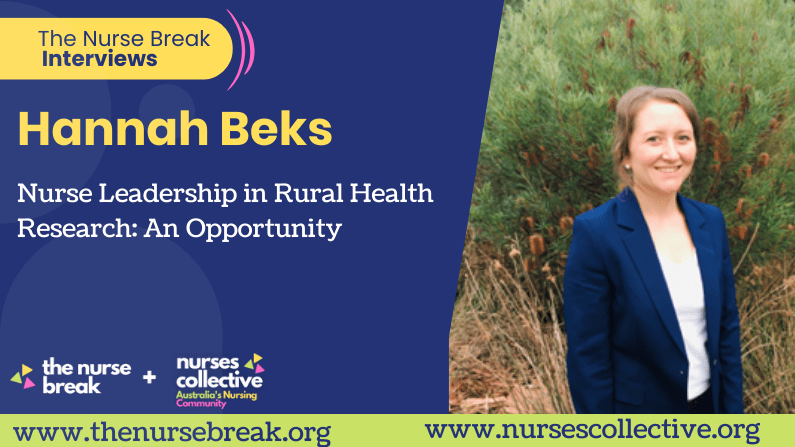Table of Contents
We are excited to bring you an interview with Hannah Bek who is a rural generalist registered nurse and research fellow with Deakin Rural Health (a University Department of Rural Health funded by the Australian Government’s Rural Health Multidisciplinary Training program).
Hannah Beks is a passionate advocate for redressing health inequity experienced by rural communities. With a growing track record in rural health research, Hannah has an interest in building an empowered nursing workforce with leadership capabilities in research, evaluation, and policy.
Starting out as an assistant nurse
During my second year of undergraduate training (Bachelor of Nursing), I commenced work as an Assistant in Nursing with a large metropolitan hospital on the coast of New South Wales (NSW) and worked across acute care areas including cardiology, orthopaedics, and emergency. These were undoubtedly some of the most challenging moments of my nursing career as I gained insights into the revolving door of chronic disease, strained resources of public health, and burnout and bullying within the nursing workforce.
I encountered firsthand the challenges of balancing unpaid clinical placements with employment, rent, and bills, and at times found myself working night shifts before university classes just to stay afloat. With the support of some exceptional registered and enrolled nurse colleagues, I gained foundational nursing skills, perfected the art of a hospital corner, and developed my communication skills.
I recall taking great satisfaction in being able to ensure my patients were showered, nourished, and comfortable as much as possible, before I left my shift. These days were formative in my career development – I have never forgotten where I’ve come from and am highly empathetic towards students and colleagues as the work we do is not easy.
Being a graduate registered nurse with rural and remote rotations
During my final year of undergraduate training, I completed a remote clinical placement and a rural clinical placement in outback NSW with support of a University Department of Rural Health. Through my clinical placements, I understood rural and remote nursing practice to be challenging, dynamic, and full of opportunity.
My eyes were also opened to the health inequity experienced by rural and remote communities, including barriers to accessing services and a disproportionate burden of lifestyle-preventable chronic disease. These were concepts I had only really read about as a student and experienced in a low-income country where I had undertaken a public health nursing internship in my final year of study (an activity I had self-funded and initiated) (Photo 1).

I was a city girl by birth, but felt the open road was calling me. I followed my curiosity and applied for a transition to practice year with rural and remote rotations in outback NSW. My first rotation was in a remote community, about three hours from the base hospital and accessible by a rocky dirt road (4WD only).
After cracking the engine mount in my hatchback during the drive (I was a little naïve), my dog and I arrived at our little cabin in the outback. Under the exceptional leadership of my Nurse Unit Manager, those four months were full of new experiences including working with the Royal Flying Doctor Service to coordinate primary healthcare clinics and emergency retrievals (Photo 2).
After this rotation, I returned to the base hospital to undertake a rotation in an acute mental health unit, and in the emergency department. From a clinical perspective, I enjoyed developing my generalist registered nurse skill set and exploring outback NSW (Photo 3). However, my interest in health inequity grew with my clinical experience and I felt I had to do something about this.


Upskilling in public health and research
My curiosity around health inequity led me to commence a Master of Public Health through distance education whilst working clinically. I found my studies therapeutic in a sense as I was able to tap into a whole new world of public health research and critical thinking to understand complex problems. Undertaking a degree whilst working was challenging, and involved a lot of late nights, making the most of slow night shifts to complete assessments, and attending some face-to-face classes in Sydney.
I will never forget the kindness of one of the Professors involved in the delivery of the course who held a biostatistics seminar in person, just for me. Although I am still paying my HECS debt, my Master of Public Health was one of the best investments and played a part in enabling my transition to a career in health research.
Transition into rural health research
After working in outback NSW for a few years, I moved to rural Victoria (Photo 4). Shortly after, the position of Associate Research Fellow with a rural health focus was advertised through the local University Department of Rural Health. At the time I was working clinically in a rural emergency department and was becoming increasingly frustrated with barriers experienced by patients to accessing primary health care services (e.g., lack of bulk billed general practitioners, difficulty accessing dentists, poorly managed chronic disease) which had flow on effects to the emergency department.
I applied for the six-month contract and was successful. Six-months working in rural health research has since turned into seven years.

My journey in rural health research has been dynamic and rewarding, with my program of research shaped by the research parameters of the Rural Health Multidisciplinary Training program (e.g., health workforce, innovative models of service delivery, Aboriginal and Torres Strait Islander Peoples’ health and wellbeing) which funds my position. Very early on, I applied my clinical knowledge to research to understand areas I grappled with, such as the acute management of mental health presentations in rural emergency and urgent care centres.
In the past few years, my research practice has shifted to exploring issues of importance to the communities I serve through a place-based approach, which included: understanding the evidence around chronic disease programs for Aboriginal and Torres Strait Islander Peoples in Australia, exploring the perceptions of community members around the management of chronic disease, and scoping mobile clinics as a model of primary health care service delivery. The latter became a focus of my Doctor of Philosophy thesis which I submitted earlier this year.
What I love about undertaking research of relevance to the rural communities I serve, is that I work in partnership with local leaders to evaluate community-developed models of service delivery, I engage with feedback from community members and health professionals, and advocate for a greater support for community-focused care. I believe my nursing background fuels my passion and underpins my program of research.
Importance of nurse leadership in rural health research
As the backbone of the health workforce across all geographical settings, especially in rural communities, nurses are important to shaping the future of health care through research. Nurse leaders provide a valuable contribution to rural and remote health research across a range of settings and contexts. As nurses, we understand the complexity of the health care system and the importance of providing safe and quality patient care, concepts that can inform the theoretical lens we apply to our research.
We also have many skills from clinical practice which are transferable to research, including communication skills, active listening, data entry, and time management skills. As our profession continues to adapt to changing population needs, including a growing burden of chronic disease, we are called to develop our capabilities in critical analysis and evidence-based practice to develop strategies to address the issues we encounter in our communities – capabilities supported by the Australian Government’s The National Rural and Remote Nursing Generalist Framework 2023-2027 released in early 2023.
As a profession, there is much work for us to do in evaluation, research, and quality improve evidence baseg building the evidence-base around nurse-led models of care. We know our work is important, as we have seen our patients encounter the gaps in services and health inequity documented in the research literature.
As a rural health researcher, I am continually grounded in my nursing roots which has shaped my view of the world. The future is looking bright as I build my network of like-minded nurse leaders and a program of nurse-led research focused on improving access to health care for rural communities with a nursing workforce focus.
Recommendations for nurses with an interest in research
In reflecting on whether research is something you would like to be involved in, I think it’s important to know your why – that is, why do you want to undertake research? For me, research is a vehicle for understanding complex issues, identifying trends in data that need to be addressed, and to assessing whether what we are doing is working or not, and if not, why.
Research can be used to initiate and measure practice change, advocate for policy or funding changes, support the need for greater investment in issues within your community, and so much more.
There is a whole world of research methodologies and methods to explore, including spatial methods to understand problems through a geographical lens. For nurses with a curiosity and interest in research, I would encourage you to reach out to your nearest university or if you are based in a rural or remote community, a University Department of Rural Health, to share your interest. You never know what opportunities await you. Who knows, you may become involved in a short-term contract which turns into seven years… and counting!






You must be logged in to post a comment.